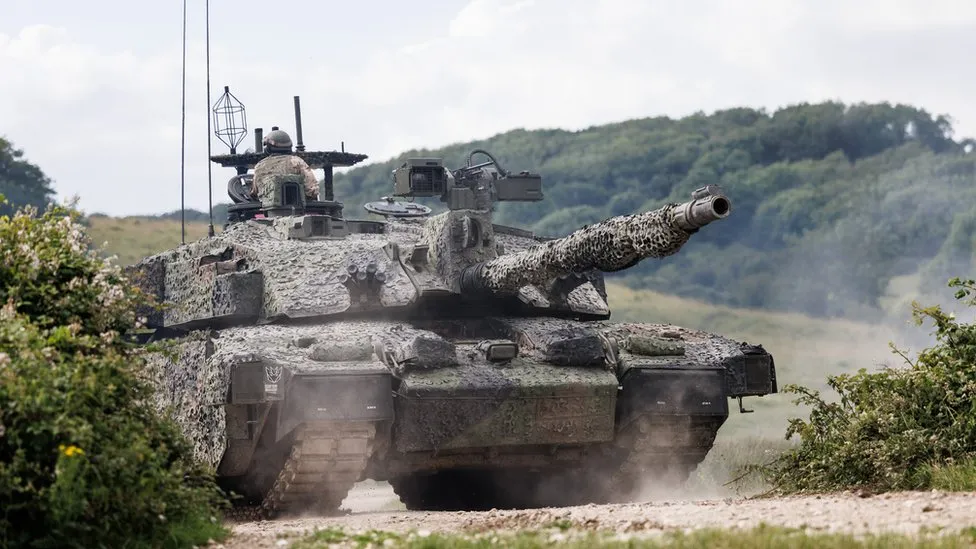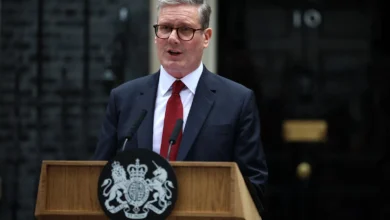
The UK’s armed forces will not be ready for a “high-intensity” war unless shortages in personnel and equipment are rapidly addressed, MPs have warned. The Commons defence committee said personnel were leaving faster than they could be recruited, and the “offer” to them had to be improved.
A “vicious cycle” needed to be broken to allow the UK to face “increasingly challenging” threats, it added. Increasing recruitment and improving retention was a priority, the MoD said.
Last month, General Sir Patrick Sanders, the head of the Army and outgoing Chief of the General Staff. called for the country to train a volunteer “citizen army” ready to fight a land war, warning that an increase in reservist numbers alone “would not be enough”.
He highlighted the threat from Russia following its invasion of Ukraine, and pointed to steps being taken by other European nations to put their populations on a “war footing”.
He also called for more to be done to equip and modernise the armed services. Sir Patrick has previously argued for the need for a larger Army, whose professional ranks now number around 73,000, compared with around 100,000 in 2010.
The cross-party defence committee’s report, “Ready for war?”, found that, while it was a “matter of national pride” that whenever the armed forces were asked to act, they found a way, “overstretch has negatively impacted high intensity warfighting readiness due to the sheer pace of operations and other commitments”.
The MPs said they were “increasingly concerned” about a “crisis” in the recruitment and retention of both regular personnel and reservists, with operational demands making recovery and training harder to achieve.
As a result, the committee said, “it is unsurprising that more people are leaving the Forces than joining them”. While acknowledging the problem and planning to address it, the government was not yet moving at the necessary pace to do so, it added.
A Ministry of Defence (MoD) spokesperson said: “Increasing recruitment and improving retention across the services is a top priority. Our armed forces are always ready to protect and defend the UK, and we continue to meet all operational commitments.”
Another area of concern highlighted was that the £1.95bn allocated for boosting ammunition stockpiles in last year’s Budget might be used to meet existing shortfalls in resources, rather than to replenish and increase capabilities.
£50bn is being spent on defence this year, the MoD spokesperson said, adding that spending on defence equipment has increased to £288.6bn over the next decade. The MoD aims to raise defence spending to 2.5% of GDP (Gross Domestic Product).
The MPs urged the MoD to reconsider and produce a breakdown of the allocation of money promised in the Autumn 2022 and Spring 2023 Budgets.
The committee also called for improvements in procurement processes to increase the UK’s industrial capacity and production of munitions, both in the context of the Ukraine conflict and any future war. This should include retaining retired equipment “even halfway viable for regeneration”, it said.
Former defence procurement minister Sir Jeremy Quin MP, who chairs the committee, described the armed services as a “world-class fighting force”, whose personnel demonstrated “immense bravery and flexibility, responding to a range of crises and threats worldwide without hesitation, never wavering in their commitment to protecting our nation”.
But, he said, “a steady, continuous drip of operations and ongoing commitments”, together with a drop in retention and a period of low recruitment – which needed to be tackled “head on” – was undermining the country’s military readiness.
Sir Jeremy said the government must “start making difficult choices: either invest fully in our military or recognise that proper prioritisation of warfighting will mean less availability for other tasks”.
Speaking just days before Sir Patrick, Defence Secretary Grant Shapps told the BBC the UK needed to be prepared for “a more dangerous world”. He warned of growing risks posed by countries including China, Russia, Iran and North Korea, as well as terrorist groups.
However, when asked when the government would meet its target of spending 2.5% of national output on defence, he said he could not give an exact date, adding that the target would be met “when economic conditions allow
Source: BBC
In other news – Gillian Keegan: I’m confident of 15 hours of free childcare by April
The education secretary has said she is “confident” free childcare for two-year-olds in England will be ready in time for its April rollout. Gillian Keegan told the BBC she would “deliver” the pledge for 15 hours per week free childcare to working parents.
She initially said she was “pretty confident” of delivering the hours, but later said she was “very confident. Read more











